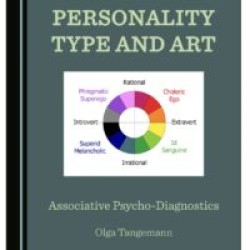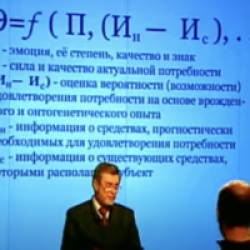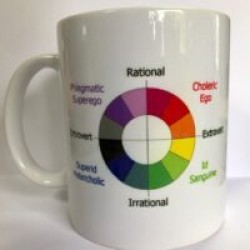Honoré de Balzac born May 20, 1799, Tours, Francedied Aug. 18, 1850, Paris) French writer. Balzac began working as a clerk in Paris at about age 16. An early attempt at a business career left him with huge debts, and for decades he toiled incessantly to improve his worsening financial condition. In 1829 his novels and stories began to achieve some success, and his early masterpieces soon followed. In a vast series he collectively called The Human Comedy, eventually numbering some 90 novels and novellas, he sought to produce a comprehensive picture of contemporary society by presenting all the varieties of human nature. Read more.
Description of socionic types made by Elena Zamanskaya and translated by Olga Yuska:
The Critic. Representatives of this type live in the torrent of life filling it with various things. For them time is valuable itself. ILIs carefully watch the tide of life. Sometimes they find it hard to switch from contemplation to dynamic actions. Basing on earlier experience they succeed in predicting behavior of their acquaintances in different situations. Timely arrive at important meetings. According to a socionic myth, ILI always know the time. As a matter of fact they just know whether they should follow the time or can be careless about it. In the latter case they can hardly tell the time. They are last-minute people. Ironic, often have a good sense of humor, which is usually black. Rather late sleepers than early-risers.
Kind and warm-hearted, though from the first sight may seem cold, estranged and unfriendly. They hate being driven out from composure and relaxation by questions like “why are you so mournful/sad/melancholic/angry?” or “Why are you so happy/sad” asked with a raised voice. Generally they are not good in managing their emotions. Unlike Gaben, who also have painful ethics of emotions, they better manage with strong positive emotions than with negative ones. Crowded and noisy parties with a lot of strangers make them feel uncomfortable. Sometimes they grumble or keep silence and don’t support general discussion. Balsacs seldom reveal strong emotions and speak very little about their feelings though with close people they get liberated and more open.
Gravitate to inner balance and harmony. Close to Socrates words: “know thyself”. They are a good company and like polemics on different topics. Have difficulties making acquainted of opposite sex especially in young age. They believe that speaking about shortcomings is rather honest than complimenting. Not pushy in relations; try to retain their independence and hold back their feelings. Democratic and prefer close distance in communication. Feel most awkward at the first stage of communication before they get emotional feedback and recognize attitudes of other people. A common course makes acquaintance much easier for them. They tend to strike out from their lives people whom they find absolutely unacceptable.
In conflicts they either use strong logical arguments or simply vanish. While fighting they can’t control their emotions and are afraid to cripple their rival due to which give preference to choking grips. Lay much weight on simple, good, warm relations and kindness. Their leisurely speech may put listeners to a sleep and soothe them. They make much of the values of different generations. Take into account interests of other people and expect same attitude from them.
Hate begging and bargaining. Manage to find the current able to bring them to a necessary target. Trying to avoid troubles they often play safe and therefore lose perspective opportunities. In unusual situation they act intuitively, rather orienting on a certain situation than on a pre-arranged plan. ILIs may break or evade generally accepted rules if they seem silly and unimportant. Prefer black and dark blue-colored clothing. Find it hard to look after their appearance on regular basis and therefore may often look untidy. Unassuming in everyday life, lack confidence in the area of decoration, design and health care. Usually have calm, reserved and concentrated look. Skeptic countenance, round-shouldered and slinky gait.
They warn others about potential dangers, suggest alternative solutions showing their strong and weak sides. If to their opinion things are running smoothly, they simply keep silent and don’t interfere with the events. ILIs know how to prepare and patiently lead another person to a necessary step. They can see well contradictions in different theories as well as divergence between words and actions. Balsacs find it hard to generate their own ideas though are very good at compiling and correcting ideas of others. Building their opinions upon analysis of versatile sources they consider them quite objective. However they may underestimate subjectivity of their approach to the filtration of information. In area of their interest they try to touch the ground and can give precise forecasts, quite good in estimating probability of different events. They usually make well-considered and suspended decisions and at the same time may spend too much time to collect and analyze information.
Respect strong, wise and talented people. They themselves don’t strive for leadership and power though sometimes maybe a power broker. More often behave modestly and prefer to remain in the shadow however feel happy to be found there. It is difficult to take care of their health and regularly practice sports. They need a good push and strong support based on a firm friendly relationship. They are good strategists and are more interested in long-term perspectives than in momentary profit. Their working capacity ranges on a large scale, from laziness to total immersion into their work, which depends on interest, future perspectives, mood and relations in the team. With outward slowness they know well how to optimally spread work in time and how to improve its methods. They can’t bare small-minded regulation of actions. Have well-developed imagination, rich inner world; and associative way of thinking. Very often have scientific cast of mind, aspire to understanding laws of nature. Get bored without new impressions and information. Perceive life in dynamics as a continuous stream of events flowing one into another. At the same time they believe in casualism and that any phenomenon may combine in itself adverse elements.










Взято из общения в группе “Соционичекое сообщество ФБ”
Оксана Н. : “И хватит множить эти стереотипы об ИЛИ!они рациональные,сверх меры адекватные,педантичные люди. Тонкие ценители высокого искусства,видящие миллион граней оттенков чувств,эмоций,характеров,ситуаций. Просто окружающий мир зачастую слишком груб,чтоб увидеть всю их изящность.и видит лишь -“почему ты грузтный,у тебя что то стряслось,ты думаешь все время о смерти,ты хочешь умереть,наверное..я тебя спасу-улыбнизь!””
By Quin, ILI subtype ILE:
“I’m into philosophy – not from the formalized standpoint where I want a database of different philosophers and their opinions in my head, but the general facility to understand thought itself and grasp the central point of any idea I come across. I am keen on cultivating basic facilities in thought over building specifics so I can understand anything from a meta perspective in that way.
I do enjoy literature, but I don’t enjoy every form of it. Some writing just goes nowhere or carries no message of interest so it turns me right off.
As for my specific interests, such as they were, I seek to understand consciousness: where it comes from, what it is “made of”, and where it goes when living beings die. Logic is useful in that, and I am good at producing and using logic, but it is not at the root of my mind or inquiries. Rather I rest on an unspoken understanding of what is “truly” there and a feel for where things are headed.
I am currently in a career where logic is king, and seeking to get further in for practicality’s sake, but the way I navigate problems is back to what my company encourages: I see through all the factors to what the issue is, immediately understand a solution, implement it, *then* backtrack to file a ticket. The company would prefer people work through the order of steps of the ticket so that solutions are implemented in the order in which they typically solve a problem and it eventually gets solved – “efficient” logic for dummies.”